Entrepreneurial Ventures, Impact, and Skills Analysis Report
VerifiedAdded on 2023/01/10
|15
|4680
|67
Report
AI Summary
This report delves into the multifaceted world of entrepreneurship and small business management. It begins by defining entrepreneurship and outlining the core characteristics and skills essential for success in this field. The report then explores various types of entrepreneurial ventures, including private, public, and social enterprises, comparing and contrasting their objectives, strategies, and stakeholders. It examines the impact of micro and small businesses on both local and national economies, highlighting their contributions to economic growth, employment generation, and competition. The report also underscores the importance of small and startup businesses in fostering a robust social economy. The analysis covers similarities and differences of entrepreneurial ventures and the impact of micro and small businesses on the local and national economies.

Entrepreneurship and
Small Business
Management
Small Business
Management
Paraphrase This Document
Need a fresh take? Get an instant paraphrase of this document with our AI Paraphraser

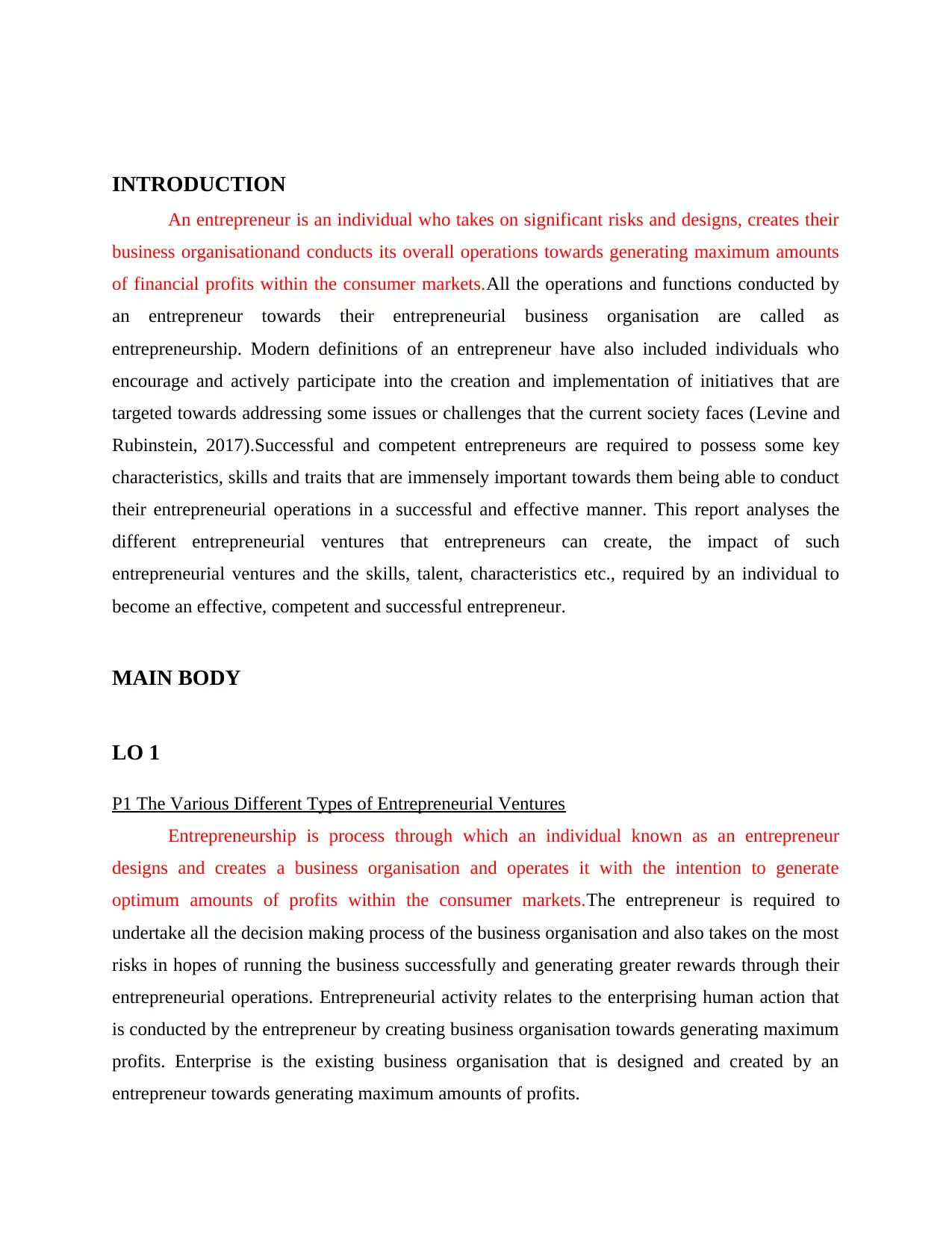
INTRODUCTION
An entrepreneur is an individual who takes on significant risks and designs, creates their
business organisationand conducts its overall operations towards generating maximum amounts
of financial profits within the consumer markets.All the operations and functions conducted by
an entrepreneur towards their entrepreneurial business organisation are called as
entrepreneurship. Modern definitions of an entrepreneur have also included individuals who
encourage and actively participate into the creation and implementation of initiatives that are
targeted towards addressing some issues or challenges that the current society faces (Levine and
Rubinstein, 2017).Successful and competent entrepreneurs are required to possess some key
characteristics, skills and traits that are immensely important towards them being able to conduct
their entrepreneurial operations in a successful and effective manner. This report analyses the
different entrepreneurial ventures that entrepreneurs can create, the impact of such
entrepreneurial ventures and the skills, talent, characteristics etc., required by an individual to
become an effective, competent and successful entrepreneur.
MAIN BODY
LO 1
P1 The Various Different Types of Entrepreneurial Ventures
Entrepreneurship is process through which an individual known as an entrepreneur
designs and creates a business organisation and operates it with the intention to generate
optimum amounts of profits within the consumer markets.The entrepreneur is required to
undertake all the decision making process of the business organisation and also takes on the most
risks in hopes of running the business successfully and generating greater rewards through their
entrepreneurial operations. Entrepreneurial activity relates to the enterprising human action that
is conducted by the entrepreneur by creating business organisation towards generating maximum
profits. Enterprise is the existing business organisation that is designed and created by an
entrepreneur towards generating maximum amounts of profits.
An entrepreneur is an individual who takes on significant risks and designs, creates their
business organisationand conducts its overall operations towards generating maximum amounts
of financial profits within the consumer markets.All the operations and functions conducted by
an entrepreneur towards their entrepreneurial business organisation are called as
entrepreneurship. Modern definitions of an entrepreneur have also included individuals who
encourage and actively participate into the creation and implementation of initiatives that are
targeted towards addressing some issues or challenges that the current society faces (Levine and
Rubinstein, 2017).Successful and competent entrepreneurs are required to possess some key
characteristics, skills and traits that are immensely important towards them being able to conduct
their entrepreneurial operations in a successful and effective manner. This report analyses the
different entrepreneurial ventures that entrepreneurs can create, the impact of such
entrepreneurial ventures and the skills, talent, characteristics etc., required by an individual to
become an effective, competent and successful entrepreneur.
MAIN BODY
LO 1
P1 The Various Different Types of Entrepreneurial Ventures
Entrepreneurship is process through which an individual known as an entrepreneur
designs and creates a business organisation and operates it with the intention to generate
optimum amounts of profits within the consumer markets.The entrepreneur is required to
undertake all the decision making process of the business organisation and also takes on the most
risks in hopes of running the business successfully and generating greater rewards through their
entrepreneurial operations. Entrepreneurial activity relates to the enterprising human action that
is conducted by the entrepreneur by creating business organisation towards generating maximum
profits. Enterprise is the existing business organisation that is designed and created by an
entrepreneur towards generating maximum amounts of profits.
⊘ This is a preview!⊘
Do you want full access?
Subscribe today to unlock all pages.

Trusted by 1+ million students worldwide
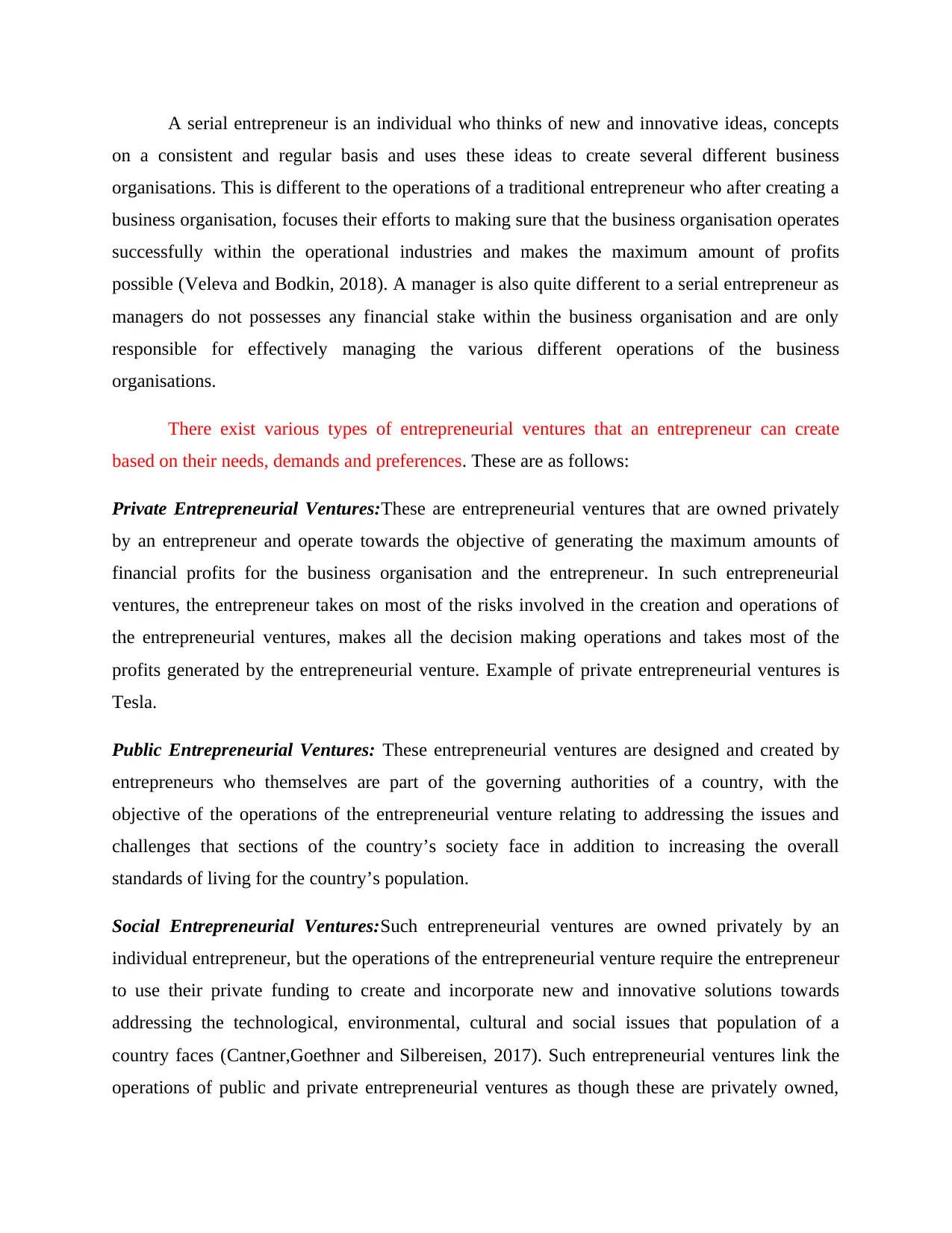
A serial entrepreneur is an individual who thinks of new and innovative ideas, concepts
on a consistent and regular basis and uses these ideas to create several different business
organisations. This is different to the operations of a traditional entrepreneur who after creating a
business organisation, focuses their efforts to making sure that the business organisation operates
successfully within the operational industries and makes the maximum amount of profits
possible (Veleva and Bodkin, 2018). A manager is also quite different to a serial entrepreneur as
managers do not possesses any financial stake within the business organisation and are only
responsible for effectively managing the various different operations of the business
organisations.
There exist various types of entrepreneurial ventures that an entrepreneur can create
based on their needs, demands and preferences. These are as follows:
Private Entrepreneurial Ventures:These are entrepreneurial ventures that are owned privately
by an entrepreneur and operate towards the objective of generating the maximum amounts of
financial profits for the business organisation and the entrepreneur. In such entrepreneurial
ventures, the entrepreneur takes on most of the risks involved in the creation and operations of
the entrepreneurial ventures, makes all the decision making operations and takes most of the
profits generated by the entrepreneurial venture. Example of private entrepreneurial ventures is
Tesla.
Public Entrepreneurial Ventures: These entrepreneurial ventures are designed and created by
entrepreneurs who themselves are part of the governing authorities of a country, with the
objective of the operations of the entrepreneurial venture relating to addressing the issues and
challenges that sections of the country’s society face in addition to increasing the overall
standards of living for the country’s population.
Social Entrepreneurial Ventures:Such entrepreneurial ventures are owned privately by an
individual entrepreneur, but the operations of the entrepreneurial venture require the entrepreneur
to use their private funding to create and incorporate new and innovative solutions towards
addressing the technological, environmental, cultural and social issues that population of a
country faces (Cantner,Goethner and Silbereisen, 2017). Such entrepreneurial ventures link the
operations of public and private entrepreneurial ventures as though these are privately owned,
on a consistent and regular basis and uses these ideas to create several different business
organisations. This is different to the operations of a traditional entrepreneur who after creating a
business organisation, focuses their efforts to making sure that the business organisation operates
successfully within the operational industries and makes the maximum amount of profits
possible (Veleva and Bodkin, 2018). A manager is also quite different to a serial entrepreneur as
managers do not possesses any financial stake within the business organisation and are only
responsible for effectively managing the various different operations of the business
organisations.
There exist various types of entrepreneurial ventures that an entrepreneur can create
based on their needs, demands and preferences. These are as follows:
Private Entrepreneurial Ventures:These are entrepreneurial ventures that are owned privately
by an entrepreneur and operate towards the objective of generating the maximum amounts of
financial profits for the business organisation and the entrepreneur. In such entrepreneurial
ventures, the entrepreneur takes on most of the risks involved in the creation and operations of
the entrepreneurial ventures, makes all the decision making operations and takes most of the
profits generated by the entrepreneurial venture. Example of private entrepreneurial ventures is
Tesla.
Public Entrepreneurial Ventures: These entrepreneurial ventures are designed and created by
entrepreneurs who themselves are part of the governing authorities of a country, with the
objective of the operations of the entrepreneurial venture relating to addressing the issues and
challenges that sections of the country’s society face in addition to increasing the overall
standards of living for the country’s population.
Social Entrepreneurial Ventures:Such entrepreneurial ventures are owned privately by an
individual entrepreneur, but the operations of the entrepreneurial venture require the entrepreneur
to use their private funding to create and incorporate new and innovative solutions towards
addressing the technological, environmental, cultural and social issues that population of a
country faces (Cantner,Goethner and Silbereisen, 2017). Such entrepreneurial ventures link the
operations of public and private entrepreneurial ventures as though these are privately owned,
Paraphrase This Document
Need a fresh take? Get an instant paraphrase of this document with our AI Paraphraser
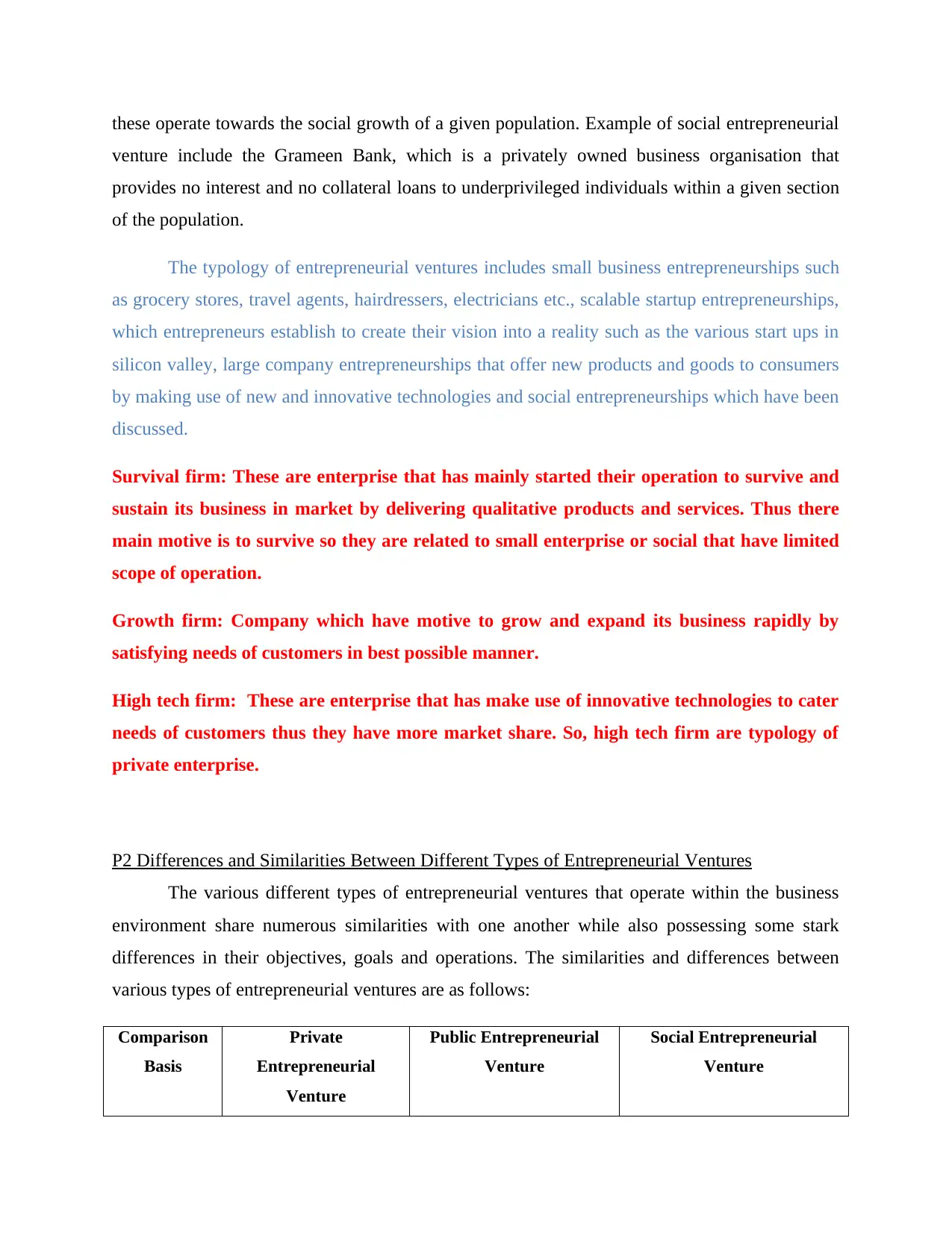
these operate towards the social growth of a given population. Example of social entrepreneurial
venture include the Grameen Bank, which is a privately owned business organisation that
provides no interest and no collateral loans to underprivileged individuals within a given section
of the population.
The typology of entrepreneurial ventures includes small business entrepreneurships such
as grocery stores, travel agents, hairdressers, electricians etc., scalable startup entrepreneurships,
which entrepreneurs establish to create their vision into a reality such as the various start ups in
silicon valley, large company entrepreneurships that offer new products and goods to consumers
by making use of new and innovative technologies and social entrepreneurships which have been
discussed.
Survival firm: These are enterprise that has mainly started their operation to survive and
sustain its business in market by delivering qualitative products and services. Thus there
main motive is to survive so they are related to small enterprise or social that have limited
scope of operation.
Growth firm: Company which have motive to grow and expand its business rapidly by
satisfying needs of customers in best possible manner.
High tech firm: These are enterprise that has make use of innovative technologies to cater
needs of customers thus they have more market share. So, high tech firm are typology of
private enterprise.
P2 Differences and Similarities Between Different Types of Entrepreneurial Ventures
The various different types of entrepreneurial ventures that operate within the business
environment share numerous similarities with one another while also possessing some stark
differences in their objectives, goals and operations. The similarities and differences between
various types of entrepreneurial ventures are as follows:
Comparison
Basis
Private
Entrepreneurial
Venture
Public Entrepreneurial
Venture
Social Entrepreneurial
Venture
venture include the Grameen Bank, which is a privately owned business organisation that
provides no interest and no collateral loans to underprivileged individuals within a given section
of the population.
The typology of entrepreneurial ventures includes small business entrepreneurships such
as grocery stores, travel agents, hairdressers, electricians etc., scalable startup entrepreneurships,
which entrepreneurs establish to create their vision into a reality such as the various start ups in
silicon valley, large company entrepreneurships that offer new products and goods to consumers
by making use of new and innovative technologies and social entrepreneurships which have been
discussed.
Survival firm: These are enterprise that has mainly started their operation to survive and
sustain its business in market by delivering qualitative products and services. Thus there
main motive is to survive so they are related to small enterprise or social that have limited
scope of operation.
Growth firm: Company which have motive to grow and expand its business rapidly by
satisfying needs of customers in best possible manner.
High tech firm: These are enterprise that has make use of innovative technologies to cater
needs of customers thus they have more market share. So, high tech firm are typology of
private enterprise.
P2 Differences and Similarities Between Different Types of Entrepreneurial Ventures
The various different types of entrepreneurial ventures that operate within the business
environment share numerous similarities with one another while also possessing some stark
differences in their objectives, goals and operations. The similarities and differences between
various types of entrepreneurial ventures are as follows:
Comparison
Basis
Private
Entrepreneurial
Venture
Public Entrepreneurial
Venture
Social Entrepreneurial
Venture

Strategy The business strategy
that is used by
privateentrepreneurial
ventures are primarily
focused on conducting
business operations in
such a way that
maximises the profits
generated by the
business organisation
and its entrepreneur.
The business strategies
used within public
entrepreneurial ventures
place increased emphasis
and focus on addressing the
social, cultural
environmental issues and
challenges that a given
population faces (Estrin,
Gozman and Khavul,
2018).
The business strategies of
social entrepreneurial ventures
make use of new, modern and
innovative solutions in order
for the business organisation
to effectively be able to
address the social and
environmental issues and
challenges it faces.
Value All privately owned
entrepreneurial ventures
provide financial value
to their owning
entrepreneurs.
All public entrepreneurial
ventures provide social
value to the population of a
given country.
All social entrepreneurial
ventures provide social value
to particular sections of the
given population of a country.
Objectives Private entrepreneurial
ventures operate
towards the objectives
of maximising the
amounts of profit
generated by the
business organisation
through its daily
operations.
Public entrepreneurial
ventures operate towards
the objectives of increasing
and enhancing the overall
standards of living of a
population (Dubal, 2017).
Social entrepreneurial
ventures operate towards the
objectives of making use of
new modern technological
solutions towards being able
to effectively address the
issuesand challenges that a
population faces.
Profit
Distribution
All the profits that are
generated by a private
entrepreneurial venture
are the property of its
ownership, investors,
shareholders to be used
as they see fit.
All the profits that are
generated by a public
entrepreneurial venture are
equally divided between its
various stakeholders of the
business such as
employees, investors,
suppliers, shareholders,
management etc.
All profits generated by social
entrepreneurial ventures are
not the property of any
singular party or individual,
instead these are divided
equally amongst the
individuals in a society.
that is used by
privateentrepreneurial
ventures are primarily
focused on conducting
business operations in
such a way that
maximises the profits
generated by the
business organisation
and its entrepreneur.
The business strategies
used within public
entrepreneurial ventures
place increased emphasis
and focus on addressing the
social, cultural
environmental issues and
challenges that a given
population faces (Estrin,
Gozman and Khavul,
2018).
The business strategies of
social entrepreneurial ventures
make use of new, modern and
innovative solutions in order
for the business organisation
to effectively be able to
address the social and
environmental issues and
challenges it faces.
Value All privately owned
entrepreneurial ventures
provide financial value
to their owning
entrepreneurs.
All public entrepreneurial
ventures provide social
value to the population of a
given country.
All social entrepreneurial
ventures provide social value
to particular sections of the
given population of a country.
Objectives Private entrepreneurial
ventures operate
towards the objectives
of maximising the
amounts of profit
generated by the
business organisation
through its daily
operations.
Public entrepreneurial
ventures operate towards
the objectives of increasing
and enhancing the overall
standards of living of a
population (Dubal, 2017).
Social entrepreneurial
ventures operate towards the
objectives of making use of
new modern technological
solutions towards being able
to effectively address the
issuesand challenges that a
population faces.
Profit
Distribution
All the profits that are
generated by a private
entrepreneurial venture
are the property of its
ownership, investors,
shareholders to be used
as they see fit.
All the profits that are
generated by a public
entrepreneurial venture are
equally divided between its
various stakeholders of the
business such as
employees, investors,
suppliers, shareholders,
management etc.
All profits generated by social
entrepreneurial ventures are
not the property of any
singular party or individual,
instead these are divided
equally amongst the
individuals in a society.
⊘ This is a preview!⊘
Do you want full access?
Subscribe today to unlock all pages.

Trusted by 1+ million students worldwide
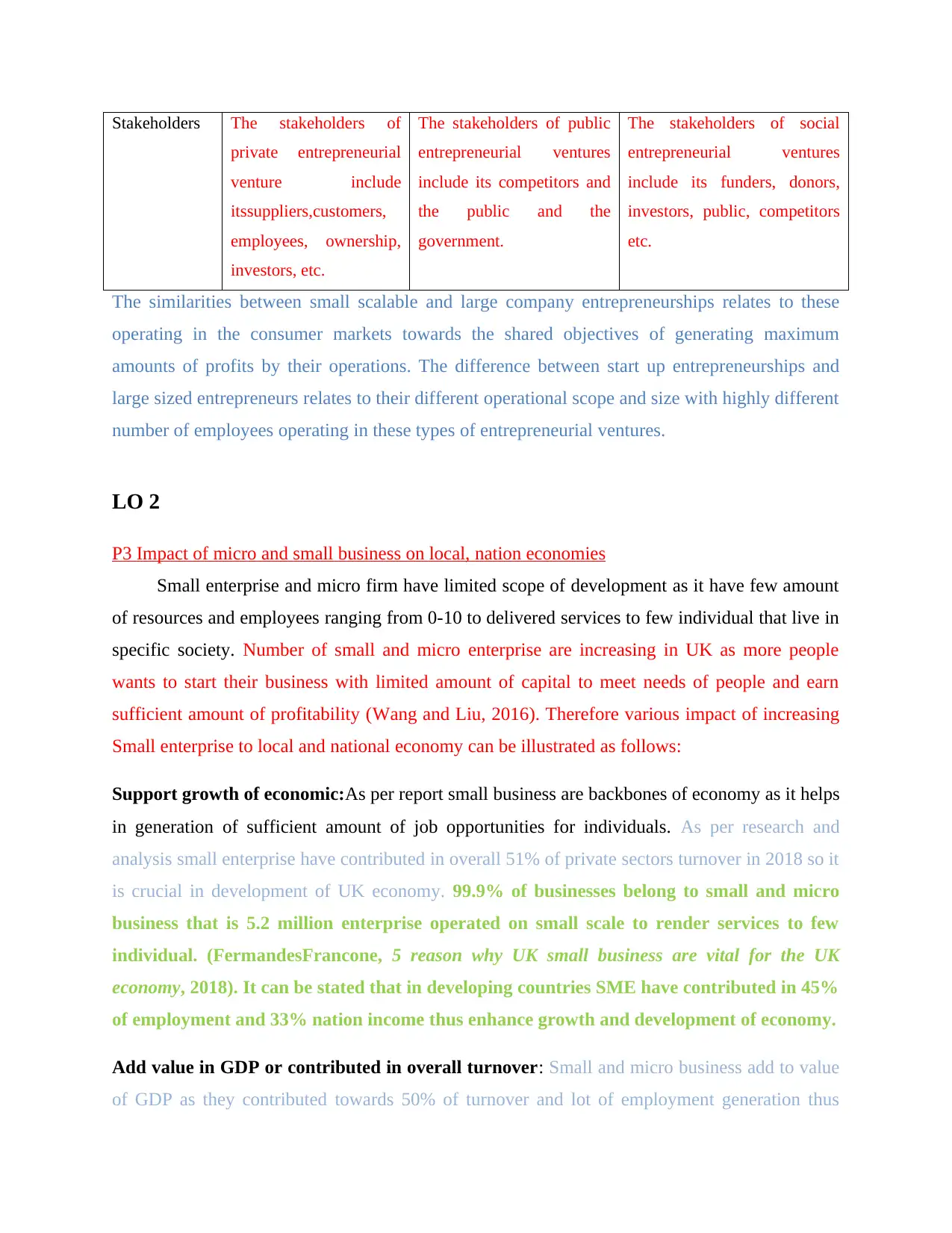
Stakeholders The stakeholders of
private entrepreneurial
venture include
itssuppliers,customers,
employees, ownership,
investors, etc.
The stakeholders of public
entrepreneurial ventures
include its competitors and
the public and the
government.
The stakeholders of social
entrepreneurial ventures
include its funders, donors,
investors, public, competitors
etc.
The similarities between small scalable and large company entrepreneurships relates to these
operating in the consumer markets towards the shared objectives of generating maximum
amounts of profits by their operations. The difference between start up entrepreneurships and
large sized entrepreneurs relates to their different operational scope and size with highly different
number of employees operating in these types of entrepreneurial ventures.
LO 2
P3 Impact of micro and small business on local, nation economies
Small enterprise and micro firm have limited scope of development as it have few amount
of resources and employees ranging from 0-10 to delivered services to few individual that live in
specific society. Number of small and micro enterprise are increasing in UK as more people
wants to start their business with limited amount of capital to meet needs of people and earn
sufficient amount of profitability (Wang and Liu, 2016). Therefore various impact of increasing
Small enterprise to local and national economy can be illustrated as follows:
Support growth of economic:As per report small business are backbones of economy as it helps
in generation of sufficient amount of job opportunities for individuals. As per research and
analysis small enterprise have contributed in overall 51% of private sectors turnover in 2018 so it
is crucial in development of UK economy. 99.9% of businesses belong to small and micro
business that is 5.2 million enterprise operated on small scale to render services to few
individual. (FermandesFrancone, 5 reason why UK small business are vital for the UK
economy, 2018). It can be stated that in developing countries SME have contributed in 45%
of employment and 33% nation income thus enhance growth and development of economy.
Add value in GDP or contributed in overall turnover: Small and micro business add to value
of GDP as they contributed towards 50% of turnover and lot of employment generation thus
private entrepreneurial
venture include
itssuppliers,customers,
employees, ownership,
investors, etc.
The stakeholders of public
entrepreneurial ventures
include its competitors and
the public and the
government.
The stakeholders of social
entrepreneurial ventures
include its funders, donors,
investors, public, competitors
etc.
The similarities between small scalable and large company entrepreneurships relates to these
operating in the consumer markets towards the shared objectives of generating maximum
amounts of profits by their operations. The difference between start up entrepreneurships and
large sized entrepreneurs relates to their different operational scope and size with highly different
number of employees operating in these types of entrepreneurial ventures.
LO 2
P3 Impact of micro and small business on local, nation economies
Small enterprise and micro firm have limited scope of development as it have few amount
of resources and employees ranging from 0-10 to delivered services to few individual that live in
specific society. Number of small and micro enterprise are increasing in UK as more people
wants to start their business with limited amount of capital to meet needs of people and earn
sufficient amount of profitability (Wang and Liu, 2016). Therefore various impact of increasing
Small enterprise to local and national economy can be illustrated as follows:
Support growth of economic:As per report small business are backbones of economy as it helps
in generation of sufficient amount of job opportunities for individuals. As per research and
analysis small enterprise have contributed in overall 51% of private sectors turnover in 2018 so it
is crucial in development of UK economy. 99.9% of businesses belong to small and micro
business that is 5.2 million enterprise operated on small scale to render services to few
individual. (FermandesFrancone, 5 reason why UK small business are vital for the UK
economy, 2018). It can be stated that in developing countries SME have contributed in 45%
of employment and 33% nation income thus enhance growth and development of economy.
Add value in GDP or contributed in overall turnover: Small and micro business add to value
of GDP as they contributed towards 50% of turnover and lot of employment generation thus
Paraphrase This Document
Need a fresh take? Get an instant paraphrase of this document with our AI Paraphraser

increasing disposable income of people and adding more and more value to GDP. Such
enterprise quickly adapts to various external changes due to small scale of operation and close
contact with customers. Increased national income by 33% thus contributed towards
economic growth of countries across worldwide. There are approximately 5.4 million micro
business in UK that have employed 0-9 individuals within firm.
Create employment: It can be illustrated that 60% of employment opportunities have been
created by small and micro business that is around 16.3 million. So, as per analysis and
interpretation almost 2 million job opportunities have been generated by small enterprise in past
5 years (How do small businesses impact the economy?, 2019).It has contributed in equal
distribution of income among large number of individual and better customers services. SME
have generated overall 600 million job opportunities for people that is 45% of total employment
in development countries. Small and medium enterprise have contributed in generation of
600 million employment opportunities across worldwide in 2015 thus it is predicted that it
will generated more employment or job in future circumstances.
Enhance competition level: At last it can be analysed and interpreted that micro businesses
helps in increasing competition level and brining innovation within economy. Due to increasing
in number of small enterprise in recent years customers are able to get varieties of products and
services at reasonable rates. At the same time many firms have improved their operation in order
to cater needs and requirement of diverse individual. As per 2019, 5.9 million businesses
belong to small and medium enterprise that is further increasing in few years due to less
amount of capital requirements and more profitability.
P4 Importance of small and start-up businesses in growth of social economy
Starts up enterprise are firms that have small amount of resources, capital to run business
and meet requirements of diverse individual and earn limited amount of profit margin in order to
sustain in market.
Social economy is formed by rich diversity of organisation or enterprise such as mutual
association to render services or products to local communities of society.
enterprise quickly adapts to various external changes due to small scale of operation and close
contact with customers. Increased national income by 33% thus contributed towards
economic growth of countries across worldwide. There are approximately 5.4 million micro
business in UK that have employed 0-9 individuals within firm.
Create employment: It can be illustrated that 60% of employment opportunities have been
created by small and micro business that is around 16.3 million. So, as per analysis and
interpretation almost 2 million job opportunities have been generated by small enterprise in past
5 years (How do small businesses impact the economy?, 2019).It has contributed in equal
distribution of income among large number of individual and better customers services. SME
have generated overall 600 million job opportunities for people that is 45% of total employment
in development countries. Small and medium enterprise have contributed in generation of
600 million employment opportunities across worldwide in 2015 thus it is predicted that it
will generated more employment or job in future circumstances.
Enhance competition level: At last it can be analysed and interpreted that micro businesses
helps in increasing competition level and brining innovation within economy. Due to increasing
in number of small enterprise in recent years customers are able to get varieties of products and
services at reasonable rates. At the same time many firms have improved their operation in order
to cater needs and requirement of diverse individual. As per 2019, 5.9 million businesses
belong to small and medium enterprise that is further increasing in few years due to less
amount of capital requirements and more profitability.
P4 Importance of small and start-up businesses in growth of social economy
Starts up enterprise are firms that have small amount of resources, capital to run business
and meet requirements of diverse individual and earn limited amount of profit margin in order to
sustain in market.
Social economy is formed by rich diversity of organisation or enterprise such as mutual
association to render services or products to local communities of society.
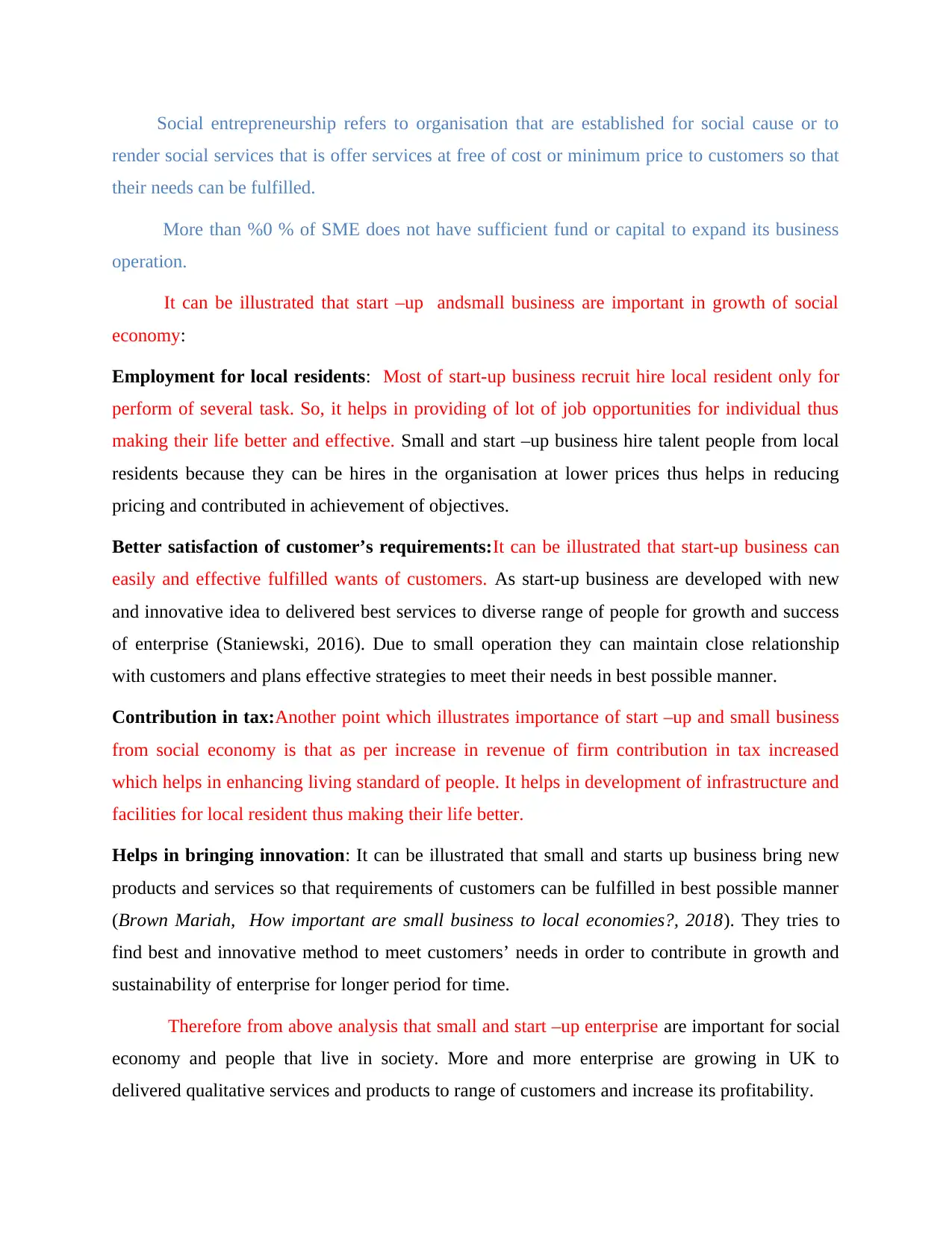
Social entrepreneurship refers to organisation that are established for social cause or to
render social services that is offer services at free of cost or minimum price to customers so that
their needs can be fulfilled.
More than %0 % of SME does not have sufficient fund or capital to expand its business
operation.
It can be illustrated that start –up andsmall business are important in growth of social
economy:
Employment for local residents: Most of start-up business recruit hire local resident only for
perform of several task. So, it helps in providing of lot of job opportunities for individual thus
making their life better and effective. Small and start –up business hire talent people from local
residents because they can be hires in the organisation at lower prices thus helps in reducing
pricing and contributed in achievement of objectives.
Better satisfaction of customer’s requirements:It can be illustrated that start-up business can
easily and effective fulfilled wants of customers. As start-up business are developed with new
and innovative idea to delivered best services to diverse range of people for growth and success
of enterprise (Staniewski, 2016). Due to small operation they can maintain close relationship
with customers and plans effective strategies to meet their needs in best possible manner.
Contribution in tax:Another point which illustrates importance of start –up and small business
from social economy is that as per increase in revenue of firm contribution in tax increased
which helps in enhancing living standard of people. It helps in development of infrastructure and
facilities for local resident thus making their life better.
Helps in bringing innovation: It can be illustrated that small and starts up business bring new
products and services so that requirements of customers can be fulfilled in best possible manner
(Brown Mariah, How important are small business to local economies?, 2018). They tries to
find best and innovative method to meet customers’ needs in order to contribute in growth and
sustainability of enterprise for longer period for time.
Therefore from above analysis that small and start –up enterprise are important for social
economy and people that live in society. More and more enterprise are growing in UK to
delivered qualitative services and products to range of customers and increase its profitability.
render social services that is offer services at free of cost or minimum price to customers so that
their needs can be fulfilled.
More than %0 % of SME does not have sufficient fund or capital to expand its business
operation.
It can be illustrated that start –up andsmall business are important in growth of social
economy:
Employment for local residents: Most of start-up business recruit hire local resident only for
perform of several task. So, it helps in providing of lot of job opportunities for individual thus
making their life better and effective. Small and start –up business hire talent people from local
residents because they can be hires in the organisation at lower prices thus helps in reducing
pricing and contributed in achievement of objectives.
Better satisfaction of customer’s requirements:It can be illustrated that start-up business can
easily and effective fulfilled wants of customers. As start-up business are developed with new
and innovative idea to delivered best services to diverse range of people for growth and success
of enterprise (Staniewski, 2016). Due to small operation they can maintain close relationship
with customers and plans effective strategies to meet their needs in best possible manner.
Contribution in tax:Another point which illustrates importance of start –up and small business
from social economy is that as per increase in revenue of firm contribution in tax increased
which helps in enhancing living standard of people. It helps in development of infrastructure and
facilities for local resident thus making their life better.
Helps in bringing innovation: It can be illustrated that small and starts up business bring new
products and services so that requirements of customers can be fulfilled in best possible manner
(Brown Mariah, How important are small business to local economies?, 2018). They tries to
find best and innovative method to meet customers’ needs in order to contribute in growth and
sustainability of enterprise for longer period for time.
Therefore from above analysis that small and start –up enterprise are important for social
economy and people that live in society. More and more enterprise are growing in UK to
delivered qualitative services and products to range of customers and increase its profitability.
⊘ This is a preview!⊘
Do you want full access?
Subscribe today to unlock all pages.

Trusted by 1+ million students worldwide
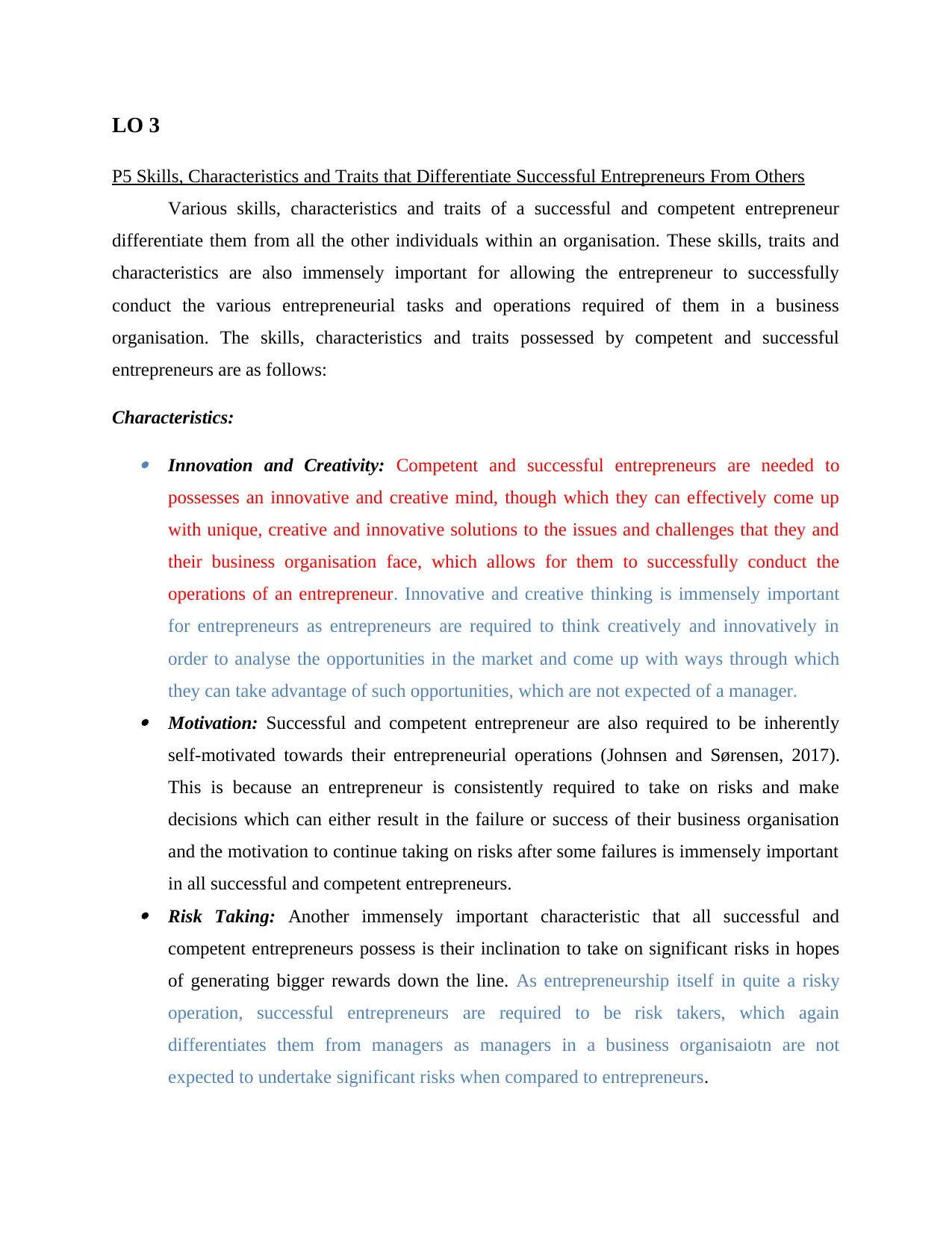
LO 3
P5 Skills, Characteristics and Traits that Differentiate Successful Entrepreneurs From Others
Various skills, characteristics and traits of a successful and competent entrepreneur
differentiate them from all the other individuals within an organisation. These skills, traits and
characteristics are also immensely important for allowing the entrepreneur to successfully
conduct the various entrepreneurial tasks and operations required of them in a business
organisation. The skills, characteristics and traits possessed by competent and successful
entrepreneurs are as follows:
Characteristics:
Innovation and Creativity: Competent and successful entrepreneurs are needed to
possesses an innovative and creative mind, though which they can effectively come up
with unique, creative and innovative solutions to the issues and challenges that they and
their business organisation face, which allows for them to successfully conduct the
operations of an entrepreneur. Innovative and creative thinking is immensely important
for entrepreneurs as entrepreneurs are required to think creatively and innovatively in
order to analyse the opportunities in the market and come up with ways through which
they can take advantage of such opportunities, which are not expected of a manager. Motivation: Successful and competent entrepreneur are also required to be inherently
self-motivated towards their entrepreneurial operations (Johnsen and Sørensen, 2017).
This is because an entrepreneur is consistently required to take on risks and make
decisions which can either result in the failure or success of their business organisation
and the motivation to continue taking on risks after some failures is immensely important
in all successful and competent entrepreneurs. Risk Taking: Another immensely important characteristic that all successful and
competent entrepreneurs possess is their inclination to take on significant risks in hopes
of generating bigger rewards down the line. As entrepreneurship itself in quite a risky
operation, successful entrepreneurs are required to be risk takers, which again
differentiates them from managers as managers in a business organisaiotn are not
expected to undertake significant risks when compared to entrepreneurs.
P5 Skills, Characteristics and Traits that Differentiate Successful Entrepreneurs From Others
Various skills, characteristics and traits of a successful and competent entrepreneur
differentiate them from all the other individuals within an organisation. These skills, traits and
characteristics are also immensely important for allowing the entrepreneur to successfully
conduct the various entrepreneurial tasks and operations required of them in a business
organisation. The skills, characteristics and traits possessed by competent and successful
entrepreneurs are as follows:
Characteristics:
Innovation and Creativity: Competent and successful entrepreneurs are needed to
possesses an innovative and creative mind, though which they can effectively come up
with unique, creative and innovative solutions to the issues and challenges that they and
their business organisation face, which allows for them to successfully conduct the
operations of an entrepreneur. Innovative and creative thinking is immensely important
for entrepreneurs as entrepreneurs are required to think creatively and innovatively in
order to analyse the opportunities in the market and come up with ways through which
they can take advantage of such opportunities, which are not expected of a manager. Motivation: Successful and competent entrepreneur are also required to be inherently
self-motivated towards their entrepreneurial operations (Johnsen and Sørensen, 2017).
This is because an entrepreneur is consistently required to take on risks and make
decisions which can either result in the failure or success of their business organisation
and the motivation to continue taking on risks after some failures is immensely important
in all successful and competent entrepreneurs. Risk Taking: Another immensely important characteristic that all successful and
competent entrepreneurs possess is their inclination to take on significant risks in hopes
of generating bigger rewards down the line. As entrepreneurship itself in quite a risky
operation, successful entrepreneurs are required to be risk takers, which again
differentiates them from managers as managers in a business organisaiotn are not
expected to undertake significant risks when compared to entrepreneurs.
Paraphrase This Document
Need a fresh take? Get an instant paraphrase of this document with our AI Paraphraser
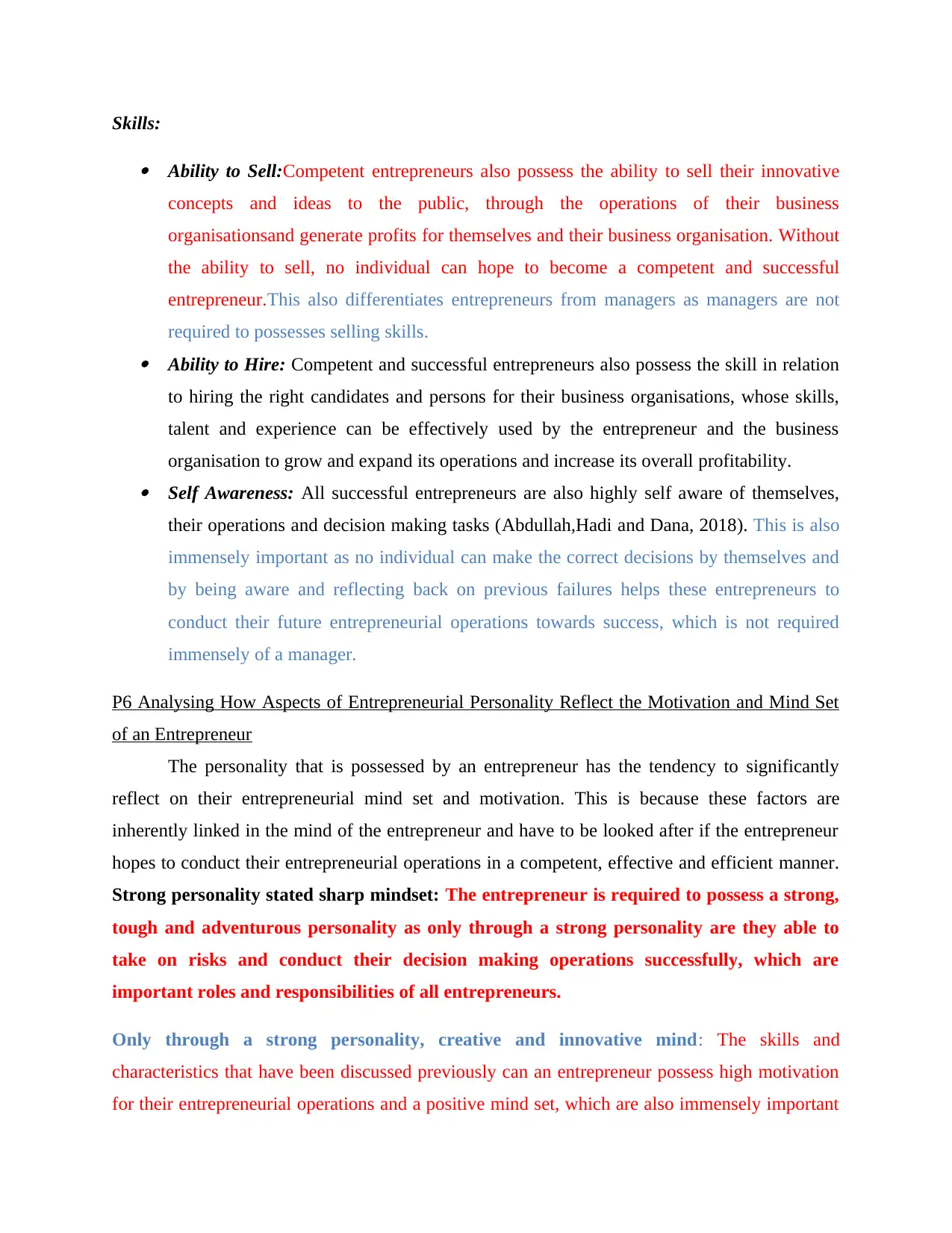
Skills:
Ability to Sell:Competent entrepreneurs also possess the ability to sell their innovative
concepts and ideas to the public, through the operations of their business
organisationsand generate profits for themselves and their business organisation. Without
the ability to sell, no individual can hope to become a competent and successful
entrepreneur.This also differentiates entrepreneurs from managers as managers are not
required to possesses selling skills. Ability to Hire: Competent and successful entrepreneurs also possess the skill in relation
to hiring the right candidates and persons for their business organisations, whose skills,
talent and experience can be effectively used by the entrepreneur and the business
organisation to grow and expand its operations and increase its overall profitability. Self Awareness: All successful entrepreneurs are also highly self aware of themselves,
their operations and decision making tasks (Abdullah,Hadi and Dana, 2018). This is also
immensely important as no individual can make the correct decisions by themselves and
by being aware and reflecting back on previous failures helps these entrepreneurs to
conduct their future entrepreneurial operations towards success, which is not required
immensely of a manager.
P6 Analysing How Aspects of Entrepreneurial Personality Reflect the Motivation and Mind Set
of an Entrepreneur
The personality that is possessed by an entrepreneur has the tendency to significantly
reflect on their entrepreneurial mind set and motivation. This is because these factors are
inherently linked in the mind of the entrepreneur and have to be looked after if the entrepreneur
hopes to conduct their entrepreneurial operations in a competent, effective and efficient manner.
Strong personality stated sharp mindset: The entrepreneur is required to possess a strong,
tough and adventurous personality as only through a strong personality are they able to
take on risks and conduct their decision making operations successfully, which are
important roles and responsibilities of all entrepreneurs.
Only through a strong personality, creative and innovative mind: The skills and
characteristics that have been discussed previously can an entrepreneur possess high motivation
for their entrepreneurial operations and a positive mind set, which are also immensely important
Ability to Sell:Competent entrepreneurs also possess the ability to sell their innovative
concepts and ideas to the public, through the operations of their business
organisationsand generate profits for themselves and their business organisation. Without
the ability to sell, no individual can hope to become a competent and successful
entrepreneur.This also differentiates entrepreneurs from managers as managers are not
required to possesses selling skills. Ability to Hire: Competent and successful entrepreneurs also possess the skill in relation
to hiring the right candidates and persons for their business organisations, whose skills,
talent and experience can be effectively used by the entrepreneur and the business
organisation to grow and expand its operations and increase its overall profitability. Self Awareness: All successful entrepreneurs are also highly self aware of themselves,
their operations and decision making tasks (Abdullah,Hadi and Dana, 2018). This is also
immensely important as no individual can make the correct decisions by themselves and
by being aware and reflecting back on previous failures helps these entrepreneurs to
conduct their future entrepreneurial operations towards success, which is not required
immensely of a manager.
P6 Analysing How Aspects of Entrepreneurial Personality Reflect the Motivation and Mind Set
of an Entrepreneur
The personality that is possessed by an entrepreneur has the tendency to significantly
reflect on their entrepreneurial mind set and motivation. This is because these factors are
inherently linked in the mind of the entrepreneur and have to be looked after if the entrepreneur
hopes to conduct their entrepreneurial operations in a competent, effective and efficient manner.
Strong personality stated sharp mindset: The entrepreneur is required to possess a strong,
tough and adventurous personality as only through a strong personality are they able to
take on risks and conduct their decision making operations successfully, which are
important roles and responsibilities of all entrepreneurs.
Only through a strong personality, creative and innovative mind: The skills and
characteristics that have been discussed previously can an entrepreneur possess high motivation
for their entrepreneurial operations and a positive mind set, which are also immensely important
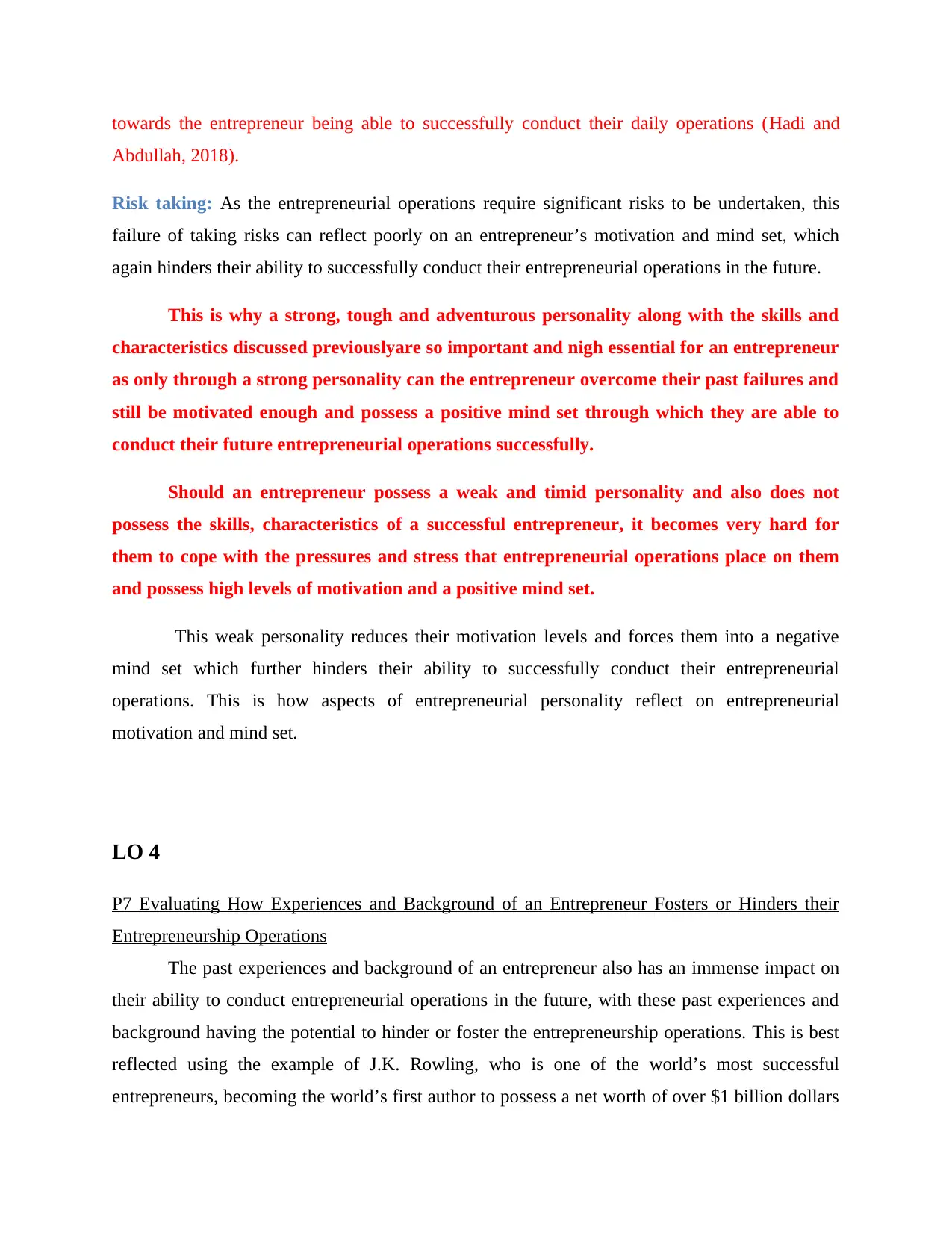
towards the entrepreneur being able to successfully conduct their daily operations (Hadi and
Abdullah, 2018).
Risk taking: As the entrepreneurial operations require significant risks to be undertaken, this
failure of taking risks can reflect poorly on an entrepreneur’s motivation and mind set, which
again hinders their ability to successfully conduct their entrepreneurial operations in the future.
This is why a strong, tough and adventurous personality along with the skills and
characteristics discussed previouslyare so important and nigh essential for an entrepreneur
as only through a strong personality can the entrepreneur overcome their past failures and
still be motivated enough and possess a positive mind set through which they are able to
conduct their future entrepreneurial operations successfully.
Should an entrepreneur possess a weak and timid personality and also does not
possess the skills, characteristics of a successful entrepreneur, it becomes very hard for
them to cope with the pressures and stress that entrepreneurial operations place on them
and possess high levels of motivation and a positive mind set.
This weak personality reduces their motivation levels and forces them into a negative
mind set which further hinders their ability to successfully conduct their entrepreneurial
operations. This is how aspects of entrepreneurial personality reflect on entrepreneurial
motivation and mind set.
LO 4
P7 Evaluating How Experiences and Background of an Entrepreneur Fosters or Hinders their
Entrepreneurship Operations
The past experiences and background of an entrepreneur also has an immense impact on
their ability to conduct entrepreneurial operations in the future, with these past experiences and
background having the potential to hinder or foster the entrepreneurship operations. This is best
reflected using the example of J.K. Rowling, who is one of the world’s most successful
entrepreneurs, becoming the world’s first author to possess a net worth of over $1 billion dollars
Abdullah, 2018).
Risk taking: As the entrepreneurial operations require significant risks to be undertaken, this
failure of taking risks can reflect poorly on an entrepreneur’s motivation and mind set, which
again hinders their ability to successfully conduct their entrepreneurial operations in the future.
This is why a strong, tough and adventurous personality along with the skills and
characteristics discussed previouslyare so important and nigh essential for an entrepreneur
as only through a strong personality can the entrepreneur overcome their past failures and
still be motivated enough and possess a positive mind set through which they are able to
conduct their future entrepreneurial operations successfully.
Should an entrepreneur possess a weak and timid personality and also does not
possess the skills, characteristics of a successful entrepreneur, it becomes very hard for
them to cope with the pressures and stress that entrepreneurial operations place on them
and possess high levels of motivation and a positive mind set.
This weak personality reduces their motivation levels and forces them into a negative
mind set which further hinders their ability to successfully conduct their entrepreneurial
operations. This is how aspects of entrepreneurial personality reflect on entrepreneurial
motivation and mind set.
LO 4
P7 Evaluating How Experiences and Background of an Entrepreneur Fosters or Hinders their
Entrepreneurship Operations
The past experiences and background of an entrepreneur also has an immense impact on
their ability to conduct entrepreneurial operations in the future, with these past experiences and
background having the potential to hinder or foster the entrepreneurship operations. This is best
reflected using the example of J.K. Rowling, who is one of the world’s most successful
entrepreneurs, becoming the world’s first author to possess a net worth of over $1 billion dollars
⊘ This is a preview!⊘
Do you want full access?
Subscribe today to unlock all pages.

Trusted by 1+ million students worldwide
1 out of 15
Related Documents
Your All-in-One AI-Powered Toolkit for Academic Success.
+13062052269
info@desklib.com
Available 24*7 on WhatsApp / Email
![[object Object]](/_next/static/media/star-bottom.7253800d.svg)
Unlock your academic potential
Copyright © 2020–2026 A2Z Services. All Rights Reserved. Developed and managed by ZUCOL.





